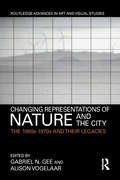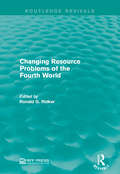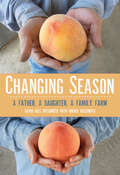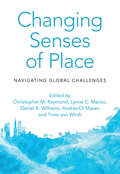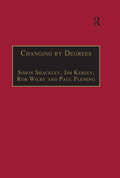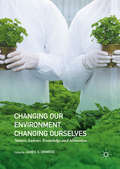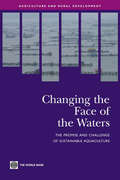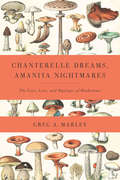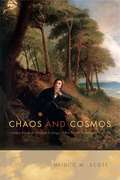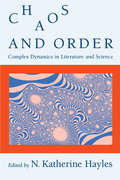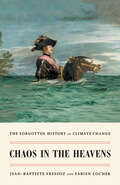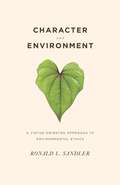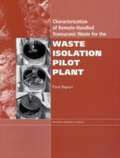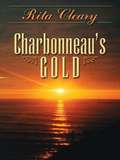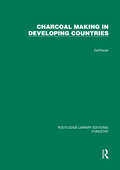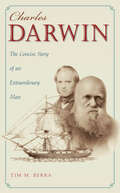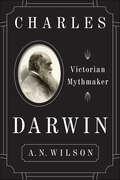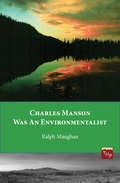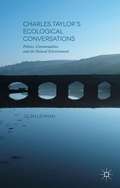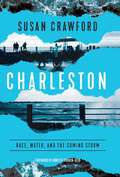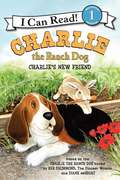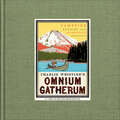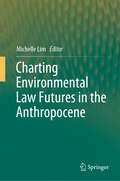- Table View
- List View
Changing Representations of Nature and the City: The 1960s-1970s and their Legacies (Routledge Advances in Art and Visual Studies)
by Gabriel N. Gee Alison VogelaarThe turn of the 1960s-70s, characterized by the rapid acceleration of globalization, prompted a radical transformation in the perception of urban and natural environments. The urban revolution and related prospect of the total urbanisation of the planet, in concert with rapid population growth and resource exploitation, instigated a surge in environmental awareness and activism. One implication of this moment is a growing recognition of the integration and interconnection of natural and urban entities. The present collection is an interdisciplinary inquiry into the changing modes of representation of nature in the city beginning from the turn of the 1960s/70s. Bringing together a number of different disciplinary approaches, including architectural studies and aesthetics, heritage studies and economics, environmental science and communication, the collection reflects upon the changing perception of socio-natures in the context of increasing urban expansion and global interconnectedness as they are/were manifest in specific representations. Using cases studies from around the globe, the collection offers a historical and theoretical understanding of a paradigmatic shift whose material and symbolic legacies are still accompanying us in the early 21st century.
Changing Resource Problems of the Fourth World (Routledge Revivals)
by Ronald G. RidkerClimbing food, fertiliser and mineral prices as well as the Arab oil embargo in the seventies had severe economic consequences in developing countries. Originally published in 1976, this study explores the effects of these developments in the fourth world and how they can adjust to an international economy with a particular focus on resource availability in terms of energy and agriculture. This title will be of interest to students of Environmental Studies.
Changing Season: A Father, A Daughter, A Family Farm
by David Mas Masumoto Nikiko MasumotoIn a series of personal essays, the organic farmer and author of Epitaph for a Peach prepares to hand his family’s eighty-acre farm to his daughter.How do you become a farmer? The real questions are: What kind of person do you want to be? Are you willing to change? How do you learn? What is your vision for the future? In this poignant collection of essays, David Mas Masumoto prepares for one of life’s greatest transitions. After four decades of working the land, he will pass down his beloved peach farm to his daughter, Nikiko. Echoing Nikiko’s words that “all of the gifts I have received from this life are not only worthy of sharing, but must be shared,” Mas reflects on topics as far ranging as the art of pruning, climate change, and the prejudice his family faced during and after World War II: essays that, whether humorous or heartbreaking, explore what it means to pass something on. Nikiko’s voice is present too, as she relates the myriad lessons she has learned from her father in preparation for running the farm as a queer mixed-race woman. Both farmers feel less than totally set for the future that lies ahead; indeed, Changing Season addresses the uncertain future of small-scale agriculture in California. What is unquestionable, though, is the family’s love for their vocation—and for each other.
Changing Senses of Place: Navigating Global Challenges
by Daniel R. Williams Lynne C. Manzo Christopher M. Raymond Andrés Di Masso Timo Von WirthGlobal challenges ranging from climate change and ecological regime shifts to refugee crises and post-national territorial claims are rapidly moving ecosystem thresholds and altering the social fabric of societies worldwide. This book addresses the vital question of how to navigate the contested forces of stability and change in a world shaped by multiple interconnected global challenges. It proposes that senses of place is a vital concept for supporting individual and social processes for navigating these contested forces and encourages scholars to rethink how to theorise and conceptualise changes in senses of place in the face of global challenges. It also makes the case that our concepts of sense of place need to be revisited, given that our experiences of place are changing. This book is essential reading for those seeking a new understanding of the multiple and shifting experiences of place.
Changing by Degrees: The Potential Impacts of Climate Change in the East Midlands (Routledge Studies in Environmental Policy and Practice)
by Paul Fleming Simon Shackley Jim KerseyIt is now accepted that the world’s climate has warmed by about 0.5°C over the past one hundred years and will continue to warm by as much as 6°C by the end of the current century. What, however, do such fundamental changes actually mean for life and the economy at the local and regional scales for the industrialized nations? This extensive study represents a state-of-the-art regional assessment of the impacts of climate change in an industrialized European nation. Providing a comprehensive set of tools, techniques and strategies, it explores the potential impacts of climate change upon key landscapes, economic and social sectors.
Changing our Environment, Changing Ourselves: Nature, Labour, Knowledge and Alienation
by James S. OrmrodIn this book, a celebration of the work of the sociologist Peter Dickens serves as the catalyst for exploring the relationship between human 'internal nature' (our health and psychological well-being) and 'external nature' (the environment on which we depend and which we collectively transform). Across contributions from Ted Benton, James Ormrod, Kate Soper, John Bellamy Foster and Brett Clark, Graham Sharp, James Addicott, Kathryn Dean and Peter Dickens himself, the book draws attention to alienation associated with the promotion of different knowledges in late capitalist production. But it also highlights the possibilities for generating less alienated relations with our environment in the future. As well as discussing the philosophical and theoretical issues involved, the book contains contemporary case studies of ultra-processed food, satellite farming, computerised thinking and dark tourism.
Changing the Face of the Waters: The Promise and Challenge of Sustainable Aquaculture
by World BankAquaculture--the farming of fish and aquatic plants--has become the world's fastest-growing food production sector, even as the amount of wild fish caught in our seas and fresh waters declines. From fish foods and pharmaceuticals to management of entire aquatic ecosystems, acquaculture is truly changing the face of the waters. Increased growth, however, brings increased risk, and aquaculture now lies at a crossroads. One direction points toward the giant strides in productivity, industry concentration, and product diversification. Another direction points toward the dangers of environmental degradation and the marginalization of small fish farmers. Yet another direction invites aquaculture to champion the poor and provide vital environmental services to stressed aquatic environments. 'Changing the Face of the Waters' offers a cutting-edge analysis of the critical challenges facing aquaculture, balancing aquaculture's role in economic growth with the need for sound management of natural resources. The book also provides guidance on sustainable aquaculture by evaluating alternative development pathways, placing particular emphasis on the application of lessons from Asia to Sub-Saharan Africa and Latin America. Aimed at policy makers, planners, and scientists, this book provides a comprehensive frame of reference for orienting ideas and initiatives in this dynamic industry.
Chanterelle Dreams, Amanita Nightmares: The Love, Lore, and Mystique of Mushrooms
by Greg Marley*Winner, International Association of Culinary Professionals Jane Grigson Award*Finalist, International Association of Culinary Professionals in the Culinary History categoryThroughout history, people have had a complex and confusing relationship with mushrooms. Are fungi food or medicine, beneficial decomposers or deadly &“toadstools&” ready to kill anyone foolhardy enough to eat them? In fact, there is truth in all these statements. In Chanterelle Dreams, Amanita Nightmares, author Greg Marley reveals some of the wonders and mysteries of mushrooms, and our conflicting human reactions to them.With tales from around the world, Marley, a seasoned mushroom expert, explains that some cultures are mycophilic (mushroom-loving), like those of Russia and Eastern Europe, while others are intensely mycophobic (mushroom-fearing), including, the US. He shares stories from China, Japan, and Korea-where mushrooms are interwoven into the fabric of daily life as food, medicine, fable, and folklore-and from Slavic countries where whole families leave villages and cities during rainy periods of the late summer and fall and traipse into the forests for mushroom-collecting excursions.From the famous Amanita phalloides (aka &“the Death Cap&”), reputed killer of Emperor Claudius in the first century AD, to the beloved chanterelle (cantharellus cibarius) known by at least eighty-nine different common names in almost twenty-five languages, Chanterelle Dreams, Amanita Nightmares explores the ways that mushrooms have shaped societies all over the globe.This fascinating and fresh look at mushrooms-their natural history, their uses and abuses, their pleasures and dangers-is a splendid introduction to both fungi themselves and to our human fascination with them. From useful descriptions of the most foolproof edible species to revealing stories about hallucinogenic or poisonous, yet often beautiful, fungi, Marley&’s long and passionate experience will inform and inspire readers with the stories of these dark and mysterious denizens of our forest floor.
Chaos and Cosmos: Literary Roots of Modern Ecology in the British Nineteenth Century
by Heidi C. ScottIn Chaos and Cosmos, Heidi Scott integrates literary readings with contemporary ecological methods to investigate two essential and contrasting paradigms of nature that scientific ecology continues to debate: chaos and balance. Ecological literature of the Romantic and Victorian eras uses environmental chaos and the figure of the balanced microcosm as tropes essential to understanding natural patterns, and these eras were the first to reflect upon the ecological degradations of the Industrial Revolution. Chaos and Cosmos contends that the seed of imagination that would enable a scientist to study a lake as a microcosmic world at the formal, empirical level was sown by Romantic and Victorian poets who consciously drew a sphere around their perceptions in order to make sense of spots of time and place amid the globalizing modern world. This study’s interest goes beyond likening literary tropes to scientific aesthetics; it aims to theorize the interdisciplinary history of the concepts that underlie our scientific understanding of modern nature. Paradigmatic ecological ideas such as ecosystems, succession dynamics, punctuated equilibrium, and climate change are shown to have a literary foundation that preceded their status as theories in science. This book represents an elevation of the prospects of ecocriticism toward fully developed interdisciplinary potentials of literary ecology.
Chaos and Cosmos: Literary Roots of Modern Ecology in the British Nineteenth Century
by Heidi C. ScottIn Chaos and Cosmos, Heidi Scott integrates literary readings with contemporary ecological methods to investigate two essential and contrasting paradigms of nature that scientific ecology continues to debate: chaos and balance. Ecological literature of the Romantic and Victorian eras uses environmental chaos and the figure of the balanced microcosm as tropes essential to understanding natural patterns, and these eras were the first to reflect upon the ecological degradations of the Industrial Revolution. Chaos and Cosmos contends that the seed of imagination that would enable a scientist to study a lake as a microcosmic world at the formal, empirical level was sown by Romantic and Victorian poets who consciously drew a sphere around their perceptions in order to make sense of spots of time and place amid the globalizing modern world. This study’s interest goes beyond likening literary tropes to scientific aesthetics; it aims to theorize the interdisciplinary history of the concepts that underlie our scientific understanding of modern nature. Paradigmatic ecological ideas such as ecosystems, succession dynamics, punctuated equilibrium, and climate change are shown to have a literary foundation that preceded their status as theories in science. This book represents an elevation of the prospects of ecocriticism toward fully developed interdisciplinary potentials of literary ecology.
Chaos and Order: Complex Dynamics in Literature and Science (New Practices Of Inquiry Ser.)
by N. Katherine HaylesThe scientific discovery that chaotic systems embody deep structures of order is one of such wide-ranging implications that it has attracted attention across a spectrum of disciplines, including the humanities. In this volume, fourteen theorists explore the significance for literary and cultural studies of the new paradigm of chaotics, forging connections between contemporary literature and the science of chaos. They examine how changing ideas of order and disorder enable new readings of scientific and literary texts, from Newton's Principia to Ruskin's autobiography, from Victorian serial fiction to Borges's short stories. N. Katherine Hayles traces shifts in meaning that chaos has undergone within the Western tradition, suggesting that the science of chaos articulates categories that cannot be assimilated into the traditional dichotomy of order and disorder. She and her contributors take the relation between order and disorder as a theme and develop its implications for understanding texts, metaphors, metafiction, audience response, and the process of interpretation itself. Their innovative and diverse work opens the interdisciplinary field of chaotics to literary inquiry.
Chaos in the Heavens: The Forgotten History of Climate Change
by Jean-Baptiste Fressoz Fabien Locher"If you want to understand the long path to the climate crisis, read this book." –Deborah Coen, Professor of History and the History of Science and Medicine, Yale UniversityPoliticians and scientists have debated climate change for centuries in times of rapid changeNothing could seem more contemporary than climate change. Yet, in Chaos in the Heavens, Jean-Baptiste Fressoz and Fabien Locher show that we have been thinking about and debating the consequences of our actions upon the environment for centuries. The subject was raised wherever history accelerated: by the Conquistadors in the New World, by the French revolutionaries of 1789, by the scientists and politicians of the nineteenth century, by the European imperialists in Asia and Africa until the Second World War.Climate change was at the heart of fundamental debates about colonisation, God, the state, nature, and capitalism. From these intellectual and political battles emerged key concepts of contemporary environmental science and policy. For a brief interlude, science and industry instilled in us the reassuring illusion of an impassive climate. But, in the age of global warming, we must, once again, confront the chaos in the heavens.
Character and Environment: A Virtue-Oriented Approach to Environmental Ethics
by Ronald SandlerVirtue ethics is now widely recognized as an alternative to Kantian and consequentialist ethical theories. However, moral philosophers have been slow to bring virtue ethics to bear on topics in applied ethics. Moreover, environmental virtue ethics is an underdeveloped area of environmental ethics. Although environmental ethicists often employ virtue-oriented evaluation (such as respect, care, and love for nature) and appeal to role models (such as Henry Thoreau, Aldo Leopold, and Rachel Carson) for guidance, environmental ethics has not been well informed by contemporary work on virtue ethics. With Character and Environment, Ronald Sandler remedies each of these deficiencies by bringing together contemporary work on virtue ethics with contemporary work on environmental ethics. He demonstrates the many ways that any ethic of character can and should be informed by environmental considerations. He also develops a pluralistic virtue-oriented environmental ethic that accommodates the richness and complexity of our relationship with the natural environment and provides effective and nuanced guidance on environmental issues. These projects have implications not only for environmental ethics and virtue ethics but also for moral philosophy more broadly. Ethical theories must be assessed on their theoretical and practical adequacy with respect to all aspects of the human ethical situation: personal, interpersonal, and environmental. To the extent that virtue-oriented ethical theory in general, and Sandler's version of it in particular, provides a superior environmental ethic to other ethical theories, it is to be preferred not just as an environmental ethic but also as an ethical theory. Character and Environment will engage any reader with an interest in environmental ethics, virtue ethics, or moral philosophy.
Characterization Of Remote-handled Transuranic Waste For The Waste Isolation Pilot Plant: Final Report
by Committee on the Characterization of Remote-Handled Transuranic Waste for the Waste Isolation Pilot PlantThe U.S. Department of Energy (DOE) disposes of plutonium-contaminated debris from its 27 nuclear weapons facilities at the Waste Isolation Pilot Plant (WIPP), an underground repository in Carlsbad, New Mexico. After four years of operational experience, DOE has opportunities to make changes to the costly and time-consuming process of "characterizing" the waste to confirm that it is appropriate for shipment to and disposal at WIPP. The report says that in order to make such changes, DOE should conduct and publish a systematic and quantitative assessment to show that the proposed changes would not affect the protection of workers, the public, or the environment.
Charbonneau's Gold: A Lewis & Clark Story
by Rita ClearyThe hardships were incredible. The duration of the trip overland and over the Rockies was much longer than expected. Some hope arrived with Charbonneau, who claimed he knew the way to the Pacific
Charcoal Making in Developing Countries (Routledge Library Editions: Forestry)
by Gerald FoleyOriginally published in 1986, this book provides a detailed examination of programmes to introduce improved charcoal making techniques throughout the developing world. Charcoal making is widely regarded as an extremely wasteful use of scarce wood resources. The book includes a section on the physics and chemistry of charcoal and descriptions of the various traditional methods of charcoal making. Patterns of charcoal supply and distribution are analysed and efforts to introduce improved charcoal making techniques are described and evaluated.
Charles Darwin: The Concise Story of an Extraordinary Man
by Tim M. BerraA brief biography of English naturalist responsible for the advancement of the science of evolution.Two hundred years after Charles Darwin’s birth (February 12, 1809), this thoroughly illustrated, yet concise biography reveals the great scientist as husband, father, and friend.Tim M. Berra tells the fascinating story of the man and the idea that changed everything. Berra discusses Darwin’s revolutionary scientific work, its impact on modern-day biological science, and the influence of Darwin’s evolutionary theory on Western thought. But Berra digs deeper to reveal Darwin the man by combining anecdotes with carefully selected illustrations and photographs.This small gem of a book includes 20 color plates and 60 black-and-white illustrations, along with an annotated list of Darwin’s publications and a chronology of his life.“Berra meets the essential curiosities a reader new to Darwin will have about a scientist still controversial in some quarters: Berra describes Darwin’s wealthy family background; notes his search for a purpose in life, which led to his embarkation on the survey ship HMS Beagle; chronicles Darwin’s fabled voyage on that ship; steers Darwin into his happy marriage to an heiress to the Wedgwood pottery fortune; and recounts the éclat with which On the Origin of Species burst upon the world in 1859. . . . A finer asset of this volume is its abundance of portraits and illustrations, including a suite of photos taken by Berra of Darwin’s home.” —Booklist
Charles Darwin: Victorian Mythmaker
by A.N. WilsonA radical reappraisal of Charles Darwin from the bestselling author of Victoria: A Life.With the publication of On the Origin of Species, Charles Darwin—hailed as the man who "discovered evolution"—was propelled into the pantheon of great scientific thinkers, alongside Galileo, Copernicus, and Newton. Eminent writer A. N. Wilson challenges this long-held assumption. Contextualizing Darwin and his ideas, he offers a groundbreaking critical look at this revered figure in modern science.In this beautifully written, deeply erudite portrait, Wilson argues that Darwin was not an original scientific thinker, but a ruthless and determined self-promoter who did not credit the many great sages whose ideas he advanced in his book. Furthermore, Wilson contends that religion and Darwinism have much more in common than it would seem, for the acceptance of Darwin's theory involves a pretty significant leap of faith.Armed with an extraordinary breadth of knowledge, Wilson explores how Darwin and his theory were very much a product of their place and time. The "Survival of the Fittest" was really the Survival of Middle Class families like the Darwins—members of a relatively new economic strata who benefited from the rising Industrial Revolution at the expense of the working classes. Following Darwin’s theory, the wretched state of the poor was an outcome of nature, not the greed and neglect of the moneyed classes. In a paradigm-shifting conclusion, Wilson suggests that it remains to be seen, as this class dies out, whether the Darwinian idea will survive, or whether it, like other Victorian fads, will become a footnote in our intellectual history.Brilliant, daring, and ambitious, Charles Darwin explores this legendary man as never before, and challenges us to reconsider our understanding of both Darwin and modern science itself.
Charles Manson was an Environmentalist
by Ralph MaughanIn the fall of 1979, millions of some of the most beautiful acres in the world were under threat. The political heat surrounding the environmental controversy prompted then Senator Frank Church to wear a bullet proof vest to public hearings. This is Ralph Maughan's personal story of the courageous creation of the Frank Church - River of No Return Wilderness.
Charles Taylor’s Ecological Conversations: Politics, Commonalities And The Natural Environment
by Glen LehmanThe author uses the work of the eminent Canadian philosopher, Charles Taylor, to develop a critique of those political perspectives that are based on instrumental ways to reason about the world, claiming that such perspectives invariably sever the connections between the social and natural worlds.
Charleston: Race, Water, and the Coming Storm
by Susan CrawfordAn unflinching look at a beautiful, endangered, tourist-pummeled, and history-filled American city.At least thirteen million Americans will have to move away from American coasts in the coming decades, as rising sea levels and increasingly severe storms put lives at risk and cause billions of dollars in damages. In Charleston, South Carolina, denial, boosterism, widespread development, and public complacency about racial issues compound; the city, like our country, has no plan to protect its most vulnerable. In these pages, Susan Crawford tells the story of a city that has played a central role in America's painful racial history for centuries and now, as the waters rise, stands at the intersection of climate and race. Unbeknownst to the seven million mostly white tourists who visit the charming streets of the lower peninsula each year, the Holy City is in a deeply precarious position. Weaving science, narrative history, and the family stories of Black Charlestonians, Charleston chronicles the tumultuous recent past in the life of the city—from protests to hurricanes—while revealing the escalating risk in its future. A bellwether for other towns and cities, Charleston is emblematic of vast portions of the American coast, with a future of inundation juxtaposed against little planning to ensure a thriving future for all residents. In Charleston, we meet Rev. Joseph Darby, a well-regarded Black minister with a powerful voice across the city and region who has an acute sense of the city's shortcomings when it comes to matters of race and water. We also hear from Michelle Mapp, one of the city's most promising Black leaders, and Quinetha Frasier, a charismatic young Black entrepreneur with Gullah-Geechee roots who fears her people&’s displacement. And there is Jacob Lindsey, a young white city planner charged with running the city&’s ten-year &“comprehensive plan&” efforts who ends up working for a private developer. These and others give voice to the extraordinary risks the city is facing. The city of Charleston, with its explosive gentrification over the last thirty years, crystallizes a human tendency to value development above all else. At the same time, Charleston stands for our need to change our ways—and the need to build higher, drier, more densely-connected places where all citizens can live safely. Illuminating and vividly rendered, Charleston is a clarion call and filled with characters who will stay in the reader&’s mind long after the final page.
Charlie The Ranch Dog: Charlie's New Friend (I Can Read! #Level 1)
by Ree DrummondCharlie the Ranch Dog is the protector of Mama's garden. No wily rabbit is going to stop Charlie!
Charlie Whistler's Omnium Gatherum: Campfire Stories and Adirondack Adventures
by Philip Delves BroughtonIn the tradition of The Dangerous Book for Boys, a visually dazzling compendium of practical knowledge, fascinating trivia, and worldly wisdom for young boys—designed as a charming and informal full-color family scrapbook treasured by generations of one family at their Adirondack summer camp.On a late summer afternoon, while rustling around in his family’s Adirondack cabin, a boy named Charlie Whistler finds a dusty cloth-bound scrapbook. It is the Omnium Gatherum, a colorful, illustrated grab bag of stories, arcana, and much more, faithfully collected over generations by Charlie’s father, grandfather, and generations of Whistlers before them.Its pages hold a universe of age-old wisdom, from the simple—how to tie a slipknot—to the esoteric—how to find your way in the forest, or predict the tides—to the exotic—how to understand simple phrases in dozens of languages.Charlie Whistler’s Omnium Gatherum is a delightful, ceaselessly readable, and unique gift book for boys of all ages: a nostalgic evocation of American childhood, a keepsake for modern fathers to hand down to their sons, and an irresistible, page-turning read for everyone who loves to lose themselves in the world of imagination.
Charting Environmental Law Futures in the Anthropocene
by Michelle LimThis book explores a range of plausible futures for environmental law in the new era of the Earth’s history: the Anthropocene. The book discusses multiple contemporary and future challenges facing the planet and humanity. It examines the relationship between environmental law and the Anthropocene at governance scales from the global to the local. The breadth of issues and jurisdictions covered by the book, its forward-looking nature, and the unique generational perspective of the contributing authors means that this publication appeals to a wide audience from specialist academics and policy-makers to a broader lay readership.
Chase the Wind
by Matt SimsThree people are out camping over the weekend to chase a storm and record its statistics. What happens when their anticipations and calculations of the storm's trajectory go wrong?
